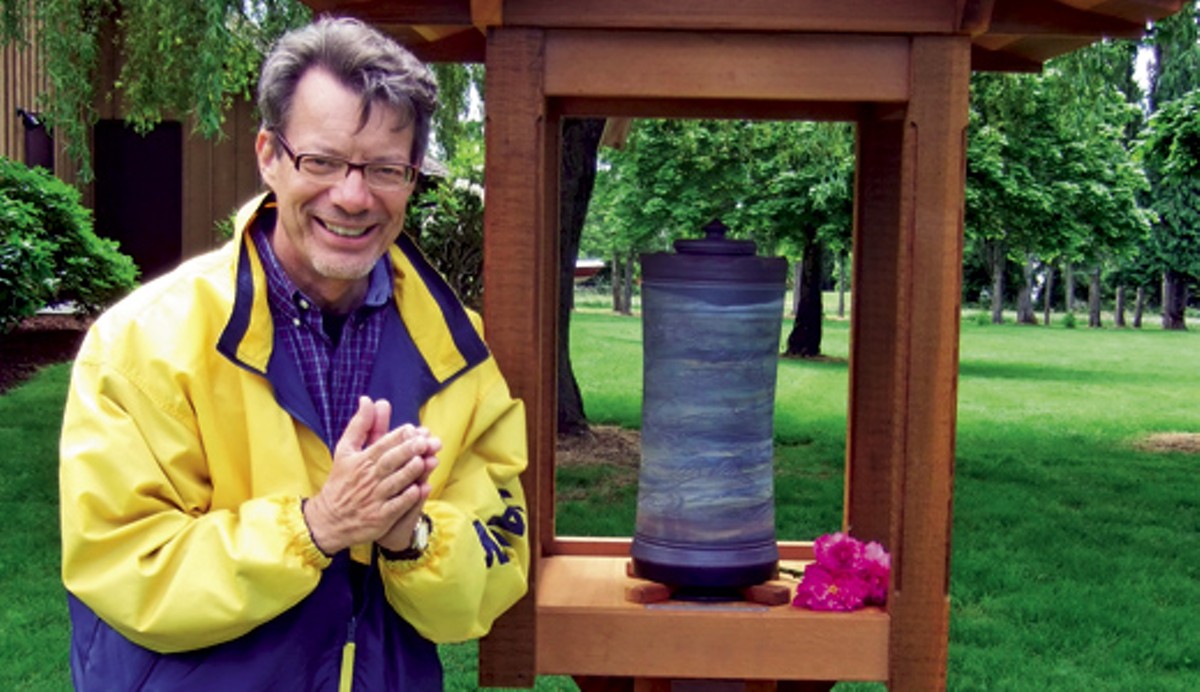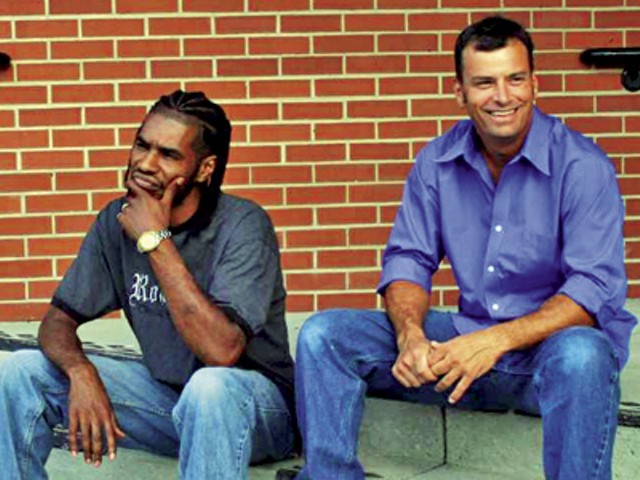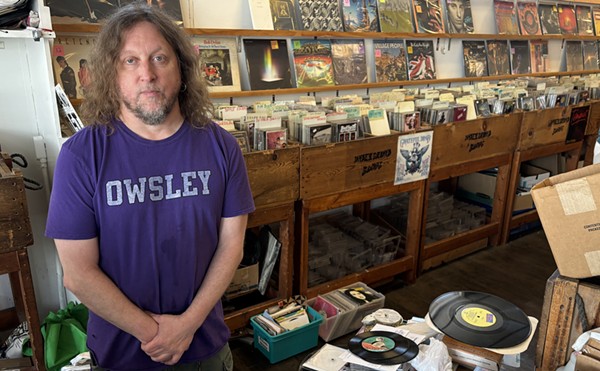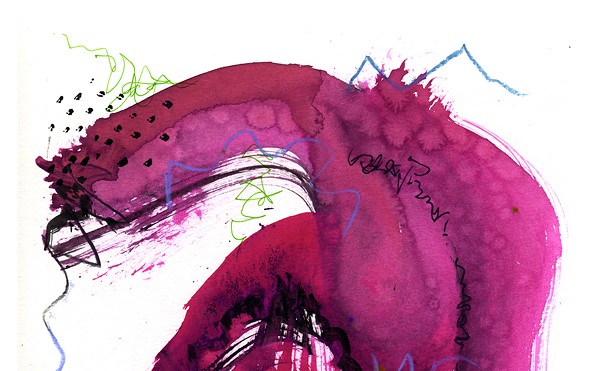There’s one thing Fenton Johnson wants you to know about reading this article — in this moment, as you pore over these words, we are all here together. Subject, writer, reader — a trinity held together by language and the printed page, sharing the same space for a few moments. This is not some hokey New Age belief for the 59-year-old Johnson, the Nelson County, Ky., native and award-winning author of bestselling books including “Geography of the Heart” and “Keeping Faith.” No, it’s a philosophy born out of the melding of his Catholic upbringing, the years devoted to his craft, his decades spent as a Kentucky expatriate, and the heartrending loss of friends and his partner from AIDS.
He references poets Walt Whitman and William Carlos Williams when describing this notion, reciting the opening of Whitman’s “Song of Myself,” which proclaims, “every atom belonging to me as good belongs to you.” Uncle Walt’s words roll off his tongue in a solid, steady baritone whose rural accent has softened over the decades he has spent away from Kentucky. “The combination of big family, small town, epidemic years, gay civil rights — they all point toward some sort of oneness,” he muses. “I like to think of that as the case.”
Johnson’s belief in this unity is particularly poignant at this moment in his life. As he approaches 60, he is working on a book about what it means to be single in a world fixated on couples and marriage. And with the release of his memoirs “Geography of the Heart” and “Keeping Faith” on audiobook in June, he finds himself in a season of reflection, looking back over some remarkable times that have taken him from the knobs of Nelson County to New York and San Francisco and Tucson, Ariz., where he teaches in the University of Arizona’s creative writing program, and finally back to Kentucky, to what he calls “the home of my heart.”
All the people and places that have shaped him are with him in this moment of oneness — as are we, reader and writer — so in the words of William Carlos Williams, “together, as one, we shall begin.”
What is it about Kentucky?
“I had a friend of mine in college at Stanford, and he said to me, ‘I grew up in Oklahoma in a small town, and I cannot imagine returning to Oklahoma. And yet everybody I ever meet from Kentucky is always talking about going back. What is it about Kentucky?’”
Johnson laughs as he throws his old friend’s question out into the air, pausing for a few seconds to let it hang there. “There is something that is peculiar to that place,” he finally admits, a riddle he has carried with him throughout his decades as an expatriate.
Johnson was born the last of nine children to hard-working parents in the hills of Nelson County, just over a knob from the Abbey of Gethsemani — and far removed from the society world of Bardstown, the county seat, Johnson is quick to point out with a smile. “The people in Bardstown did not acknowledge us, and we cordially returned the favor.”
The monks who lived at Gethsemani were frequent guests at his family’s tavern, wandering over for a glass or two of bourbon and company in the evenings. He is reminded of the abbey’s influence on his life every day in a very basic way: “My parents pretty much gave me to the monks to be named, and they came back with Clement and Fintan. My mother rejected Clement — they’ll call him Clem — but accepted Clement’s pre-monastery given name John; then she misspelled Fintan on the birth certificate.”
Like most Kentucky kids who turned out to be artists, Johnson was captivated by the landscape that surrounded him. “I’m really grateful for that — that I grew up in a beautiful place, which was rich and complicated and difficult, but finally at some deep level, nurturing history,” he says. “My mother tells me I was always scribbling in a corner, and I expect that was true. I do know that there was a change in my character clearly observable in photographs, from the sunny 5-year-old to someone darker and more guarded by as early as 9 or 10. I believe now this was because of my growing awareness that I was different — a difference attributable in part, but only in part, to being gay. I became an outsider, less a participant than observer, which is a critical quality for a writer.”
Johnson’s family had been among the first to settle his home county, with his great-grandfather fighting for the Union in the Civil War. But from an early age, there was a journeyman quality to the young outsider, a hunger for the big city, to move west to California. Little did he know that it was in his genes: “In every generation, there has been one person who’s gone to California or who has gone west.”
He followed his ancestors after graduating from high school, heading west to attend college at Stanford, with his parish priest and his father’s buddies predicting he would get above his raising and “come back a hippie.” He proved them right, returning at Christmas with shoulder-length hair and a burgeoning social conscience. These formative years also eventually led him to embrace his identity as a gay man.
In the summer of 1987, coming off the end of a relationship, he met Larry Rose, a high school English teacher, at a memorial service for a mutual friend. The connection was instant, and they couldn’t get enough of one another, sharing passions for good writing, music and France. Everything was the way it should be — until Rose was diagnosed as HIV-positive.
Just tell the damn story
When Rose died of AIDS in 1990, Johnson was heartbroken, full of anger and sadness, taking time to explore his grief. His novels “Crossing the River” and “Scissors, Paper, Rock” were published, but he had another story to tell, one that was not being chronicled in the handful of books beginning to appear about the epidemic: the experience of loving and caring for someone with AIDS.
“When I was writing ‘Geography,’ I was filled with anger, of course, and I would go off on a rant about Ronald Reagan … and the crassness of the media in refusing to talk about the cause and how the disease was spread,” Johnson recalls. “And finally I typed a note to myself, which was just tell the damn story. And I taped it above my desk, and it was the best advice I ever gave myself. The story was so powerful that the best thing I could possibly do was to try to get out of the way of it and just let it tell itself.”
When it was published in 1996, “Geography of the Heart” was hailed for its tender portrait of grief, loss and emotional renewal, winning the prestigious Lambda Literary Award and the American Library Association Gay, Lesbian, Bisexual Book Award for Nonfiction (as the honor was then called).
“I don’t lay any claim to it,” Johnson says of the book. “It was a gift given to me by other people and by destiny, I guess you could say.”
Critics and readers alike responded to its heartfelt portrayal of his relationship with Rose, who was determined to fully experience his life to the very end, which came during a holiday the two took to France. Even today, 17 years after its publication, “Geography of the Heart” is listed among the top 20 bestselling gay biographies and memoirs on Amazon, a testament to its emotional resonance. In June, the memoir will be released on audiobook, read by Johnson himself in a poignant performance.
“I couldn’t imagine anyone else reading that book,” he says. At the same time, he found it “unnerving” to return to that moment in his life, to put himself back among the words and feelings of years gone by. “To be brought back to that period when there … didn’t seem to be any kind of hope of any consequence — and that attitude was not misplaced. If you see that documentary that came out, ‘How to Survive a Plague’ (the 2012 Academy Award-nominated film about the early years of the AIDS epidemic), the doctors who were interviewed would say, ‘You know, in 1994 we didn’t really have any hope and we got lucky.’ So to be taken back to that period was emotionally very challenging, but it also reminded me of my motivation for the book in the first place.”
At the time, most of the memoirs about the epidemic were filled with rage and despair, emotions Johnson calls “very justified, very righteous.” Yet he wanted to chronicle a different experience, one he had witnessed firsthand on the streets of San Francisco and in the homes and hospital rooms of friends dying of AIDS.
“My experience with the epidemic had been one of love,” he explains. “I had seen people when we did not have any idea of the causes of the disease or how it was transmitted, and there was fear everywhere, and we were being maligned by the institutions of government and church. And yet people went in and took care of their own. And they also went in and took care of complete strangers. That was my motivation in writing ‘Geography.’”
When he thinks now about those years, that love is what endures — “the nobility and sacrifice of people who had every reason not to do what they were doing,” he says. “I hold on to that a lot. When I look at any social justice cause, when I look at the current situation in this country, with the vast and incredible growing disparity between the very rich and the very poor — which we seem to be incapable, unwilling, to deal with — I remember that activism of the AIDS years in which people did what we aren’t supposed to do, what a strictly speaking ‘biologist’ would tell us we are not capable of doing — which is that we were genuinely altruistic. We were willing to sacrifice ourselves for some greater and tangible good.”
In retrospect, it seems only natural that his next book would explore another interior journey, inherently connected to the one he chronicled in “Geography of the Heart.”
“What does it mean to have faith?” was a question he began asking himself in his grief as he reflected on his Catholic upbringing. “Keeping Faith: A Skeptic’s Journey” was published in 2003, investigating how one could be a skeptic and still have faith. In conversations with Trappist and Buddhist monks, Johnson also recounted his own faith journey that melds the two spiritual traditions. The book received both the Kentucky Literary Award for Nonfiction and the Lambda Literary Award for Best LGBT Creative Nonfiction in 2004.
“I believe in the big picture sense that it’s all one unity,” he says. “If we could just grow to understand the essential Buddhist truth, that there is no separation between you and me, or the essential Christian truth, which is that we are all one in Christ Jesus — they’re both different versions of the same thing. I’m with all of those people who died, still, and they’re still with us.”
The release of “Keeping Faith” on audiobook is also an important milestone for Johnson, one that has been years in the making. While he reads the audio version of “Geography of the Heart,” he was intent on someone else recording “Keeping Faith” — his friend the Rev. Rachel Srubas, pastor of Mountain Shadows Presbyterian Church in Tucson. “I really wanted to hear that book in a woman’s voice,” he says, “because among its strands is what I consider to be a kind of feminist history of Christianity. There are some very important women’s issues that I take up.”
“Keeping Faith,” he says, is rooted in his firm belief in the oneness of community.
“I wrote a book about faith because all virtues begin with it, including and most especially love, and because it is a virtue that our secular age most needs. I don’t mean belief in God, though that can be a means to the end of faith. I mean confidence in our capacity to work together to achieve greatness and to take the sharpest edges off our necessary solitude. Faith in oneself, faith in others, which is or should be the same as faith in God. Faith in a larger order, which it is our charge not to violate but to revere and cultivate.”
This notion of collectivity is one that he wishes more Kentuckians would embrace about the landscape of the commonwealth, which he believes is being destroyed by the coal industry. “(It’s) what the Buddhists call a koan, a riddle that is given to us to challenge rationality, that is not supposed to have a solution,” he explains. “It’s a koan to me …why it is that people who are so deeply attached to the place and speak of it in reverent terms … can watch it be raped and pillaged, even in some cases participate in it and make money off of it. I don’t get that.”
Another conundrum he is attempting to understand is his place as a single man in a world that is constructed around couples. Johnson still adheres to the Catholic notion of vocation — having a calling, a reason that we are each on this planet. Identifying one’s calling is relatively easy for monks and priests and ministers, he believes, and even for partnered or married people. But what about the solitaries, as he calls them? “What is the affirmative destiny of somebody … to whom it is given — there’s a deliberate use of the passive voice — to whom it is given to be single?” he muses. “That’s what I’m writing about.
Apples and oranges
Since leaving Kentucky so many years ago, Johnson has grown to appreciate the interplay that his native state’s legacy has had with his experiences in California, where he has spent most of his life, a “creative and constructive dissonance” that continues to inform both his writing and worldview.
“There’s a phrase I used a long time ago which I like a lot about Kentucky and California, which was this small green apple and this large navel orange. Apples and oranges are each beautiful and wonderful in their way, and apples are grown in Kentucky and oranges in California, and I’ve been lucky to have both apples and oranges in my life.”
Apples are especially important to him these days, as he returns often to Kentucky to teach in Spalding University’s Low Residency in MFA in Writing Program. The students he mentors there are different than the ones he has encountered during his tenure at various colleges and universities on the coasts in New York and California. His students at Spalding and Arizona, he says, are more attuned to mystery and humility rather than in a belief that information will prove to be humanity’s saving grace.
“They are more likely to be interested in investigating some sense of the interior journey,” he explains. “I think that there is a deeper sense that manifests itself in attachment to place.”
Johnson feels that connection more intently himself these days, as he spends time with his ailing 97-year-old mother who is struggling with dementia. “She says all the time, ‘I want to go home, I want to go home.’ And I have discussed with my sisters whether … she’s speaking of the metaphorical home rather than the literal home. And you know, there’s the old concept from everybody’s hymnal that we have finally one home, and in some big and metaphorical way, I believe that we have one home … where we will all be one.”
Jason Howard is the author of “A Few Honest Words: The Kentucky Roots of Popular Music.” His work has been featured in The New York Times, the Nation, Paste, Sojourners, and on NPR.






